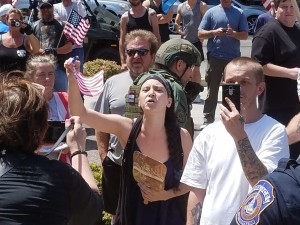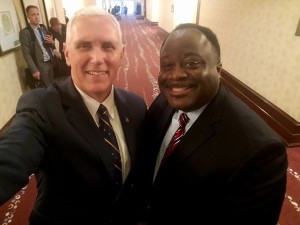Aaron Bailey Did Not Have to Die
by Abdul Hakim-ShabazzThis may sound strange, but I agree with many Aaron Bailey supporters that he did not have to die at the hands to two IMPD officers.
I say that because after reading St. Joseph County special prosecutor Kenneth Cotter’s report, I am convinced that the person most responsible for Aaron Bailey’s death is Aaron Bailey. Could the IMPD officers have done something differently? Maybe. But ultimately, had Bailey complied with the officers’ lawful commands, or made several other choices that night he would likely still be alive today, or at least not been shot several times. Allow me to explain.
First of all, ask anyone in law enforcement, and they will tell you, there is no such thing as a routine traffic stop. When the officer walks up and approaches a vehicle, there is a chance he or she won’t come back. And at 1:30 in the morning near 16th and Tremont I will also argue those chances increase quite a bit.
Secondly, Officer Carlton Howard noticed Baily’s vehicle at a gas station at the pump with all four doors open and no occupants. He didn’t investigate at the time, but about 10 minutes later he saw the same vehicle getting ready to exit the parking lot, and while it ample room to pull in front of him and leave, they waited until he drove past. Carlton allowed the vehicle to pass, and later the car changed lanes without signaling. He ran a license plate check and saw that Bailey’s license was suspended. Thus the traffic stop begins.
So what do we have so far? Suspicious activity at 1:30 in the morning by two individuals.
He asked Bailey for his license, who said he didn’t have one, so the officer asked for his ID. The officer did tell Bailey it was “no big deal” that he didn’t have his license, this was confirmed, according to the special prosecutor’s report, by Shamika Ward, the passenger. Also during this time, Bailey was described as getting more nervous and agitated during the traffic stop, to the point where Ward told him to calm down.
When Officer Howard ran a check on both Bailey and Ward, he saw that Bailey had a number of criminal arrests and convictions and he was a suspect in multiple robberies. Ward was being monitored for a homicide, and any officer who came in contact with her was to detain her and notify the detective.
So what do we have so far? Suspicious activity at 1:30 in the morning by two individuals, one of whom is connected to a homicide.
The second police officer (Dinnsen) arrives on the scene, and when Howard asks Bailey to get out of the car (twice) Bailey rolls up his window and takes off, and the pursuit begins.
So what do we have now? Suspicious activity at 1:30 in the morning by two individuals, one of whom is connected to a homicide, and they take off during the traffic stop.
The high-speed chase ensues, dispatch is notified, Bailey eventually crashes into a tree.
Howard and Dinnsen pull up to crash, get out of his car, draws their weapons, notice the airbags have been deployed. Howard says Bailey had his back to him and he could not see his hands. They kept telling Bailey to show him his hands. Ward raised her hands; Bailey kept rummaging near the center console. They continued to order Bailey to show his hands, Bailey began to turn around, and the officers discharged their weapons.
So what do we have now? Suspicious activity at 1:30 in the morning by two individuals, one of whom is connected to a homicide, and they take off during the traffic stop. They crash. The officers repeatedly ordered him to show his hands. Ward does. Bailey doesn’t. He appears to be rummaging for a weapon, starts to turn around and the officer’s fire at him.
But that’s not all. Most interesting, to me, is the statement of Shamika Ward, the passenger. She told the special prosecutor that she and Bailey had consumed half a pint of Vodka before going out that evening. And they were going to make some money by taking bar soap, cutting it up and placing it in baggies to try to sell it as cocaine. (Note: This is a very quick way to get shot by someone other than law enforcement.)
Ward also said that Bailey didn’t want to pull over as the officer initiated the traffic stop. But she convinced him thinking they were getting pulled over because the batter in his GPS home detention tracker went out and he would be in violation of his probation.
So what do we have now? We have Bailey whose initial evening plans were to sell fake drugs, driving on a suspended license while on probation with a broken GPS tracker at 1:30 in the morning with a person who wanted for questioning in connection with a homicide.
Once Bailey fled during the traffic stop, Ward begged him to stop. But he didn’t, and they later crashed into a tree. She said she was stunned and could not see or hear, later she realized they were being shot at by police. She says she remembers hearing three shots and Bailey telling her she had been shot. Ward says she remembers the officers saying get your hands up. She also told the special prosecutor that Bailey did not open the console, but it opened upon impact with the airbag deployment.
So what do we have now? We have Bailey whose initial evening plans were to sell fake drugs, driving on a suspended license while on probation with a broken GPS tracker at 1:30 in the morning with a person who wanted for questioning in connection with a homicide. They take off during the traffic stop. They crash. The officers repeatedly ordered him to show his hands. Ward does. Bailey doesn’t. He appears to be rummaging for a weapon, starts to turn around and the officers fired at him.
Based on these facts, the person most responsible for Aaron Bailey’s death is Aaron Bailey. He would not have had to die at the hands of IMPD officers had he not been out in violation of his probation, not made the choice to cut up bar soap and pass it off as drugs to sell, not fled during the traffic stop and complied with the officers when they immediately told him to show his hands.
We can argue about whether IMPD should have had to two relatively new officers on patrol at that time of day, that’s a fair question. And we can look at the protocols for discharging a weapon to make sure they are appropriate. But when you look at it in the aggregate, based on these facts, it is extremely unlikely Aaron Bailey would have died had he made different choices, and unless new facts say otherwise he had several opportunities to do so.

 The other day I had the honor of helping emcee the 10-Point Coalition’s annual luncheon. It’s an event raise money for programs that tackle issues like urban youth violence and empowering minority communities to help make them self-sufficient. The keynote Speaker was Vice-President and former Governor Mike Pence. I covered Pence as a Congressman and later as Governor. And I follow his movements pretty closely as V.P.
The other day I had the honor of helping emcee the 10-Point Coalition’s annual luncheon. It’s an event raise money for programs that tackle issues like urban youth violence and empowering minority communities to help make them self-sufficient. The keynote Speaker was Vice-President and former Governor Mike Pence. I covered Pence as a Congressman and later as Governor. And I follow his movements pretty closely as V.P. 
